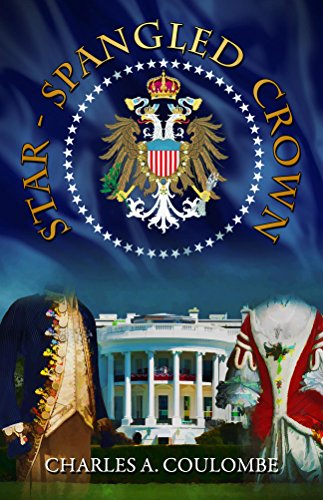
Charles A. Coulombe has penned a rich, colourful, penetrating new book devoted to (apparently) the most improbable of themes: American Counter-Revolution.
Star-Spangled Crown is a fictional exploration of a 22nd Century America, which – following staggering cultural division and breakdown, indeed anarchy – has abandoned her revolutionary origins to embrace the heritage of European Christendom that her founding fathers rejected in 1776. As the title indicates, that renounced heritage includes monarchy – and a Catholic and Christian social order.
A fanciful book, then? Sometimes. A frivolous one? Never.
For the unlikely scenario – which unlikeliness the author remains highly conscious of – belies serious purpose. Not only has Coulombe long been singularly, gravely concerned with the ongoing cultural degeneration of America (as with the rest of the Secular West), he has devoted long years to meditating on the multifaceted roots of our decay.
Those multifaceted roots pertain to matters as diverse as law, politics, education, culture, the military, agriculture and the land, etc and the book is really a collection of essays devoted to each of these.
In other words, Star Spangled Crown is only very minimally the story of a fictional American King.
What is much more important are the policies the imaginary king uses to restore health to a devastated America, which, again, turn on her law, politics, education and so forth.
Almost needless to say, what the new Catholic monarch envisages in each of these areas, entails healing what has been ruptured.
For Coulombe is aware that America is entirely based on a profound rupture from her European Christian roots. After all, the original pilgrim fathers fled Europe, because the Anglican trappings of the Church of England in the early 1600s were too Catholic for their tastes! Just in itself, that initial Puritan revolt amounted to a colossal rejection of everything that Europe had once been.
But the process of rejecting European Christendom for a spartan, secular, stripped-down individualistic ethos only continued with the Deist rationalism of the 1776 revolutionaries, a century and a half later. And Colombe is aware how the same soul-destroying process continues inexorably today, stripping every last ounce of Christianity out of America.
‘Coulombe is aware’ … what am I saying?! For my words here are feeble indeed. In truth, I should confess something here. Not only is ‘Coulombe aware’, but speaking personally, he has has been a main, if not the major, educator for me in these American matters for long years now.
A little digression is in order, dear Reader. Back in 2009, when I first began this website, I was an American living in Spain with her (ostensibly) Catholic king. And Spain, as well as France, had been slowly working to disabuse me of my last remaining American prejudices – that so many Americans like myself reflexively hold – as to the ‘uncontested superiority of the liberal-American way of life’. (Here it may be best if I say I am using the word ‘liberal’ in the classical sense, meaning that nearly all of we Americans, right or left, are liberal.)
During that Spanish period of my life, I discovered Coulombe’s remarkable book Puritan’s Empire – which I then reviewed in depth (here). And it was then that I first got to grips with the author’s provocative thesis – that so many of America’s present ills are rooted in her original Puritan rejection of All Things Catholic.
For that original Puritan revolt is the father not only of 1776, but also of so much of the vast liberal secularism that has come to command our world via America. (This is not to deny the enormous damage of the French liberalism of 1789 – but it is America, not France, that now dominates global culture.)
In short, Charles A. Coulombe has been grappling with very serious issues for the course of his adult life (whereas I spent much of my adult life in a liberal-New Age construct of the unlimited ‘progress’ of the West! Liberalism goes hand in hand with the ‘dawning Age of Aquarius’).
Yes, Charles Coulombe, I am indebted to you, along with the great Valentin Tomberg and Hilaire Belloc, for helping to set me free … (Indeed, I had also discovered Tomberg’s Catholic legal-political thought in Spain, where I began a series of posts devoted to them. I was also struck by the many parallels between Tomberg’s and Coulombe’s political thinking regarding Christendom, as I have expanded on here.)
But let us return to Star-Spangled Crown. In many ways, the book is a (small) companion volume to the (much larger) Puritan’s Empire. Whereas Puritan’s Empire is concerned with the original rupture from European Christian tradition, Star-Spangled Crown is, as I say, a meditation on how that dissociation might be healed.
Once again, it achieves that through a series of essays – which can almost be read separately – addressing different domains of culture. Each essay is written from the fictional perspective of a 22nd Century historian, looking back at the history of both Christendom and America and an imaginary history of how an increasingly nightmarish 21st Century America turned, at last, to monarchy.
Interwoven with all this is social commentary on the ever-deepening divisions within American society. For example, Coulombe writes of the growing tyranny of the Supreme Court and Federal government leading to imagined, but increasingly likely, scenarios such as this:
With order breaking down in more and more localities … a real threat [emerged], especially after the chief justice of Alabama was deposed by our presidential order for refusing to sanction a polygamous and incestuous marriage at precisely the moment that serious racial rioting broke out in Montgomery.
Such commentary is then further interwoven with an elaborated vision of an emerging American government combining elements of monarchy and democracy, in ways that both echo and develop what the aforementioned Belloc (and, indeed, Tomberg in his little-known legal theses) were clearly getting at:
Perhaps what makes the current Congress most different from the former one are … the lack of organised parties – every vote is what was once called a ‘conscience‘ vote, whereby the Representatives and Senators vote according to their own mind …. What has been attempted is to make congress truly representative of its constituents.
To this we might add that his imaginary Catholic monarch does nothing to impose Catholicism on America. Indeed, his governance actively supports surprising things like Mormonism in Utah and mosques …
So much more might be cited that is at once provocative and penetrating …
But I draw to my close with this observation. When one has had the felicity that I have had, of reading both Star-Spangled Crown and its precursor Puritan’s Empire, it becomes evident that the author has devoted his life to an immensely fertile study of American history and culture.
What has resulted is not only an encyclopaedic knowledge in regard to these things – very much in evidence in both books! – but indeed a remarkable paradox.
For on the one hand, Coulombe has courageously risked being labelled that most dreadful of things in American society: un-American. And from what I have written, one might suppose that his vision of American Counter Revolution is informed by a despairing, ranting hatred of all things American. However, the author is far from being a despairing, ranting traditionalist (as, alas, some are!).
No, all the author’s work is pervaded by good humour. (Indeed he was once a stand-up comedian and there is often real wittiness in what he writes, despite its underlying gravity.)
More importantly, though, we come to ‘the other hand’ – the paradox I mentioned. For Star-Spangled Crown could hardly be more American – filled with Americana – and, despite everything, a clear love for all that is wholesome and good in so much of American folklore, music, films, literature etc!
As such the book pays tribute to so many aspects of American life, including things often very obscure, but strange and wondrous. (For example, did you know both George Washington and Bonnie Prince Charlie of England’s exiled Stuart monarchy refused the throne of America back in the 1700s? Or that Franklin Delano Roosevelt took measures to ensure beauty and harmony in the building of American post offices? I didn’t!)
In the end, the merit of this book is that it really has so very much to do with love. Charles Coulombe loves the Church and the culture it produced: Christendom. But, warm, good-natured Christian that he is, he loves his own country too and everything that is beautiful therein.
Hardly surprisingly, then, the new American monarch he portrays is a man animated by the same love. He does not seek to destroy America but save all that is noble within her by reintegrating it within the traditions of Christendom.
What results is a fascinating mixture of history, culture, politics, theology, social commentary – and provocative, original thinking. It comes very highly recommended.

Buying Books at Amazon Through These Links Gives Us a Commission. This Supports Our Apostolate. Thank You if You Can Help Us Like This!

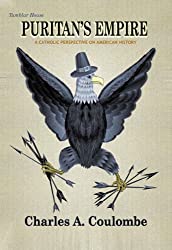
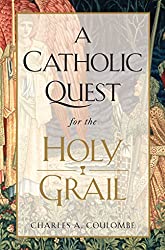
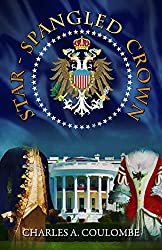
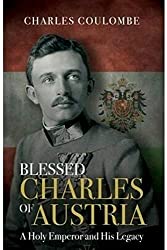
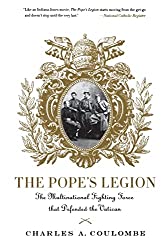
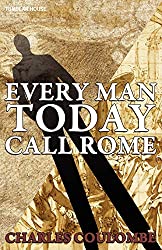
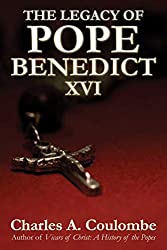
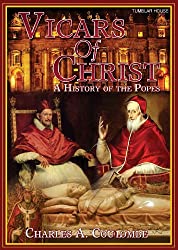
Comments
comments are currently closed
4 responses to “Star-Spangled Crown by Charles A. Coulombe – Review”
[…] Star-Spangled Crown by Charles A. Coulombe: Review — by Roger Buck at Cor Jesu Sacratissimum […]
[…] And today I venture a humorous diversion, from the Papal Knight Charles A. Coulombe. For as I recently said in my review of his latest work Star-Spangled Crown: […]
Hi Roger,
I tend to agree that the above scenario is unlikely. I think that America is more likely to disintegrate a la the USSR than it is to renounce its founding principles, which is what installing a monarchy will inevitably boil down to. I should also add that according to Leo XIII, Catholicism is compatible with all forms of government including a republic, and I think that his call for the French legitimists to work with their Republic seems to disprove the idea the monarchy is the only acceptable form of government. Even if such a monarchy can be established, who would be the monarch? Americans would never accept a monarch transplanted from Europe, and the WASP families most likely to be monarchs are highly unlikely to be Catholic. In fact, we can be lucky that America was founded as a republic, since if a king was enthroned, there would be a state church given the trends in Protestantism at the time, which would almost certainly persecute Catholics (look at the history of Protestant monarchies who felt threatened by Catholicism and therefore tried to stamp it out in their kingdoms). For those reasons, I’m afraid that an American monarchy is highly wishful thinking and even if it could be achieved, I’m not sure if it would be desirable for the reasons outlined above.
Ridiculously belated thanks for this, Young Ireland. I am sorry it was that long. I find it hard to keep up with the internet, though I need to prioritise people like you, who are good enough to contribute to this site.
Alas, I am not only pressured, but also a slow, plodding person, partly for reasons contemplative, but maybe also, at times, sinful sloth.
Your point about the unlikeliness of this scenario is well-taken – a point the author fully understands himself.
Two comments I have.
First, I point you particularly to what I said above – with some added emphasis in case I didn’t make the point strongly enough before.
This book contains a great deal of rich insight, even if, like many wonderful books, it is indeed a fantasy. But fantasy can reveal …
Second your point about “founding principles” is good. But what is striking about the book is how much the new American monarch works to honour and integrate these with his reign. Look to my review above and see if you can find the words Mormonism and mosques.
These point to the great breadth of imagination in the book and understanding and indeed love of America.